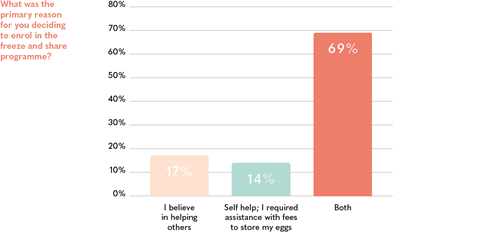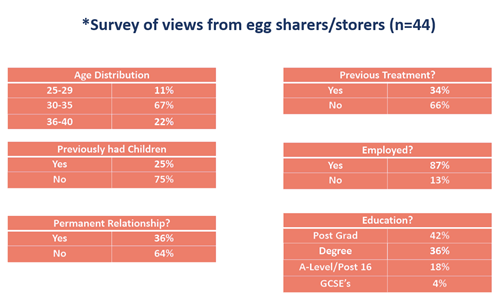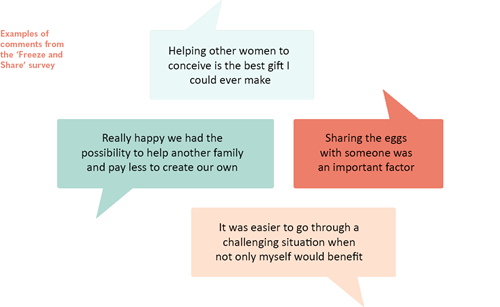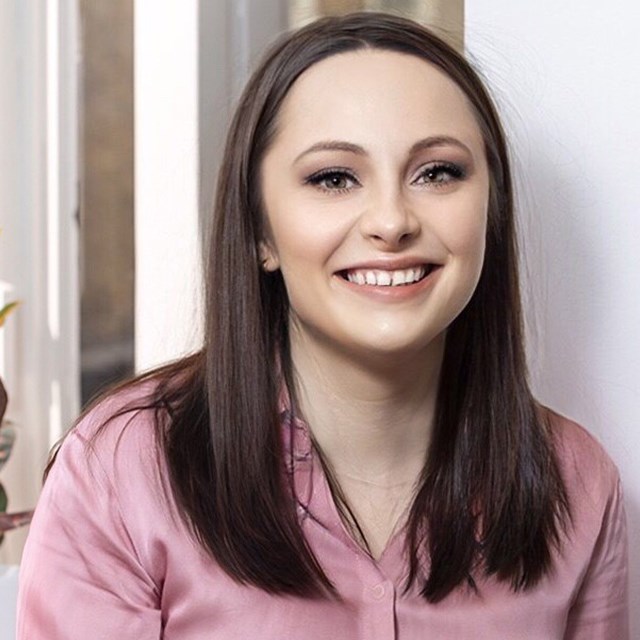Why Do Women Freeze and Share Their Eggs?
A study carried out by London Egg Bank looking into the motivations of women who have joined the ‘Freeze and Share’ programme, confirmed a long-held belief that altruism is the leading factor for participating.
The survey, carried out in the beginning of 2021, looked into the motivations for women who partook in the London Egg Bank ‘Freeze and Share’ programme, which sees a woman undergoing egg freezing for no cost, in return for donating a portion of her collected eggs to other women in need. These women are often unable to produce their own healthy eggs due to advanced age or conditions like early menopause, and are therefore in need of donor eggs to start their family.

Self-Help in Protecting Future Fertility
It has been over 20 years since London Women’s Clinic, the partner fertility clinic to London Egg Bank, launched their ‘Egg Sharing IVF’ programme which involves a woman donating her eggs to others, and in return receiving subsidised IVF treatment. Many studies during the intervening years have shown that altruism and a strong desire to help women less fortunate than themselves was compelling motivator for those taking part.
Whilst the end results for women in the London Egg Bank ‘Freeze and Share’ programme are a little different, their motivations remain the same. Women undergoing freezing and sharing are not biologically infertile and seeking treatment themselves, but are fertile women simply preserving their fertility options for the future. This has been enabled much by the incredible advances in freezing eggs and the latest vitrification techniques, which ensure the safety and viability of eggs. As a result, the process has become much more routine and straightforward.
“Sharing eggs with someone was an important factor. It was easier to go through a challenging situation when not only myself would benefit.”

Demographically, the survey found that most women were fully employed (87%) with university degrees (78%), and were 30-35 years old (67%).
Mixed Motivations: Helping Someone and Helping Yourself
More insightfully, the survey also found that for the majority of women (69%), they named both self-help and the desire to help others as their reason for joining the ‘Freeze and Share’ programme, with only 14% of women listing the financial support for themselves as their reason for joining.
This altruistic desire to help others was further highlighted in the feedback from the respondents, who chose to detail their reasons for participating. One woman claimed that she and her partner were “really happy we had the possibility to help another family and pay less to create our own.” Another said that “helping other women to conceive is the best gift I could ever make.”
The large majority of participants said that their treatment was “excellent” or “good”, with 84% stating that they “felt confident” about the procedures and freezing technology used.

Dr Peter Bowen-Simpkins, Medical Director
How Long Can I Store My Eggs? 55 Years?
Approximately half of the respondents indicated their intention to use their frozen eggs within 10 years. As of 1 July 2022, there have been changes to the rules regarding the duration of storing eggs, sperm, or embryos. Prior to this date, most people were typically allowed to store their eggs, sperm, or embryos for a maximum of 10 years.
The current law permits the storage of eggs, sperm, or embryos for treatment purposes for a period of up to 55 years from the initial storage date. However, it is important to note that to lawfully continue storage, you will need to renew your consent every 10 years.
"This new law provides greater flexibility and convenience for individuals who choose to freeze their eggs," stated Dr. Peter Bowen-Simpkins, Medical Director of London Women's Clinic. "It helps to overcome the time constraint associated with fertility by allowing egg freezing to preserve fertility options." Dr. Bowen-Simpkins highlighted the need for a review of the 10-year storage limit in his 2018 paper titled 'The UK's Anomalous 10-year Limit on Oocyte Storage: time to change the law,' published in the RBMO."

Future Research
Social egg freezing is still a relatively new procedure and therefore there are many questions that remain unanswered.
As one respondent said in the survey, they desired “a bit more clarity about the actual costs involved, and then some more information on how many eggs will survive the fertilisation process and be suitable for implantation.” Both London Egg Bank and London Women’s Clinic strive to be upfront and transparent when it comes to the cost of treatment and even clearer about the outcome of treatments so that patients are able to have realistic expectations.
Our own evidence suggests that more than 90% of vitrified eggs will survive freezing and thawing and that IVF with frozen eggs can be just as successful as treatment with eggs that are freshly collected. Although, there is not enough evidence yet that can accurately measure the optimal number of eggs needed to be collected in different age groups, in order to offer the best chance at pregnancy.
Interested in London Egg Bank's Freeze and Share Programme?
See how you can help yourself and someone else today.

Director of Operations of London Egg Bank.
Read More about Egg Freezing

Why the best time to freeze your eggs is before your 30s
Women’s fertility declines more rapidly after 30, so it’s a good idea to start thinking about freezing eggs earlier to give you the best chance of a successful later pregnancy.
What is the best age to freeze my eggs?
As with all fertility matters, there’s no black-and-white answer about the perfect time to freeze eggs that will apply to all women.
